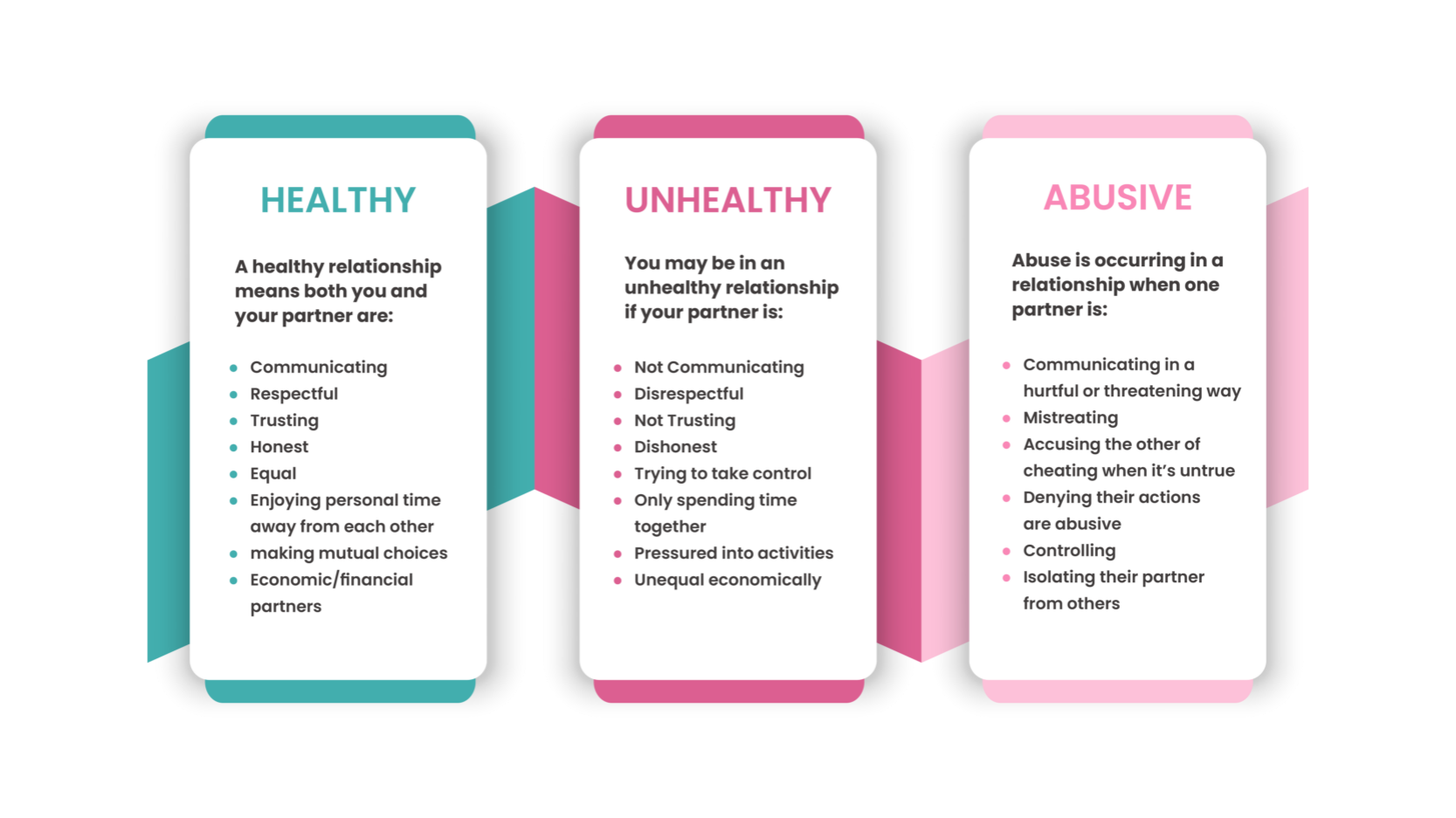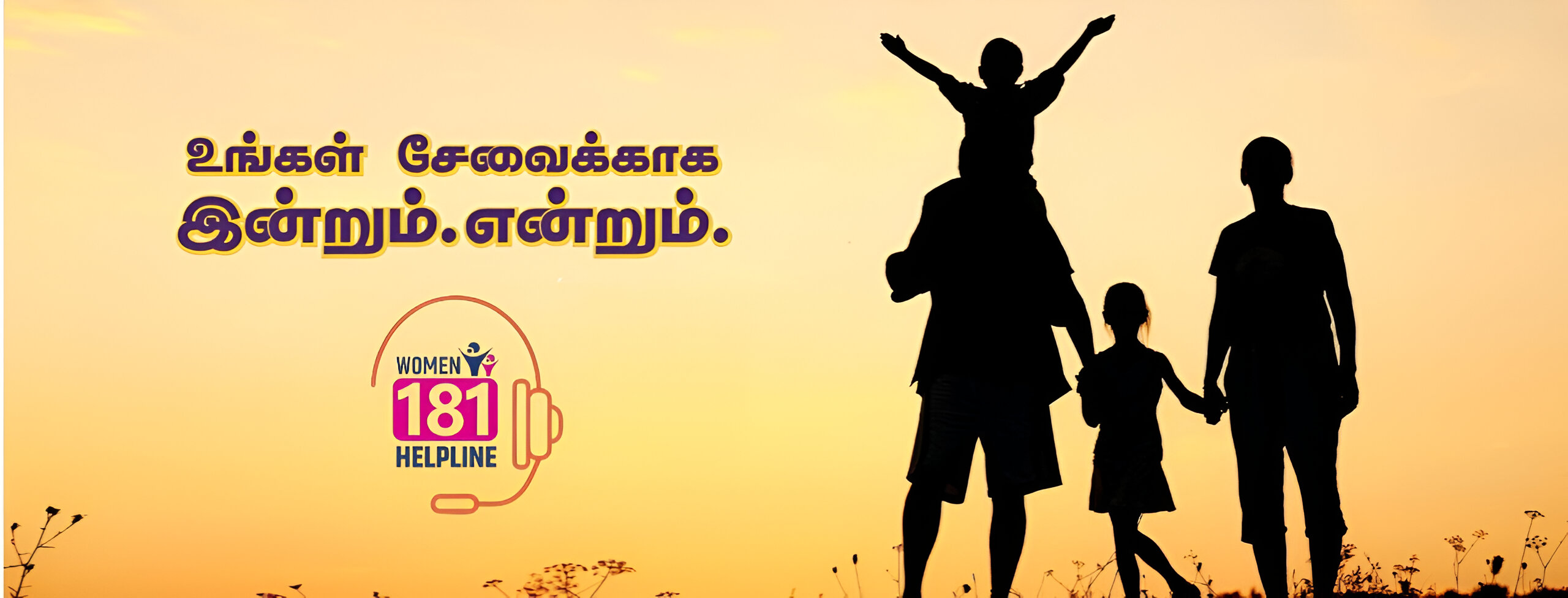WOMEN HELPLINE.
FREE. CONFIDENTIAL. 24/7.
UNDERSTANDING HEALTHY RELATIONSHIPS HELPS RECOGNIZE ABUSE
While all relationships are different, there are some key characteristics that differentiate a healthy relationship from an
abusive one. Healthy relationships are built on honesty, respect, trust, and communication.
The relationship spectrum will help you understand your relationship status.
181 Women Helpline (WHL) is a 24-hour confidential service for women and child survivors and victims of any
form of violence, including domestic & intimate partner. The multi-channel helpline is available through dialing 181,
email, and through online chatting. All calls are free and confidential.

HEALTHY
A healthy relationship means that both you and your partner are:
- * Communicative. Listen to each other attentively and with respect. Openly talk about issues that concern each other, acknowledging that you have a right to ‘agree to disagree’.
- * Respectful. Value each other’s differences and give each other the freedom to be who you are. Value each other’s needs, opinions, and feelings without judging.
- * Trusting. You believe each other and are comfortable confiding in each other as you feel safe with each other.
- * Honest. You are secure enough to be your real self with each other and understand that you can also keep some things private.
- * Equal. Each of your interests and desires are considered with equal importance. Both have an equal say in matters and decision-making.
- * Setting boundaries. Both respect each other’s need for time and space. You are able to communicate with each other about things you are comfortable with and not.
- * Practicing consent. You discuss openly about sexual and reproductive choices together. Are able to openly say ‘no’ and are respected for that.
UNHEALTHY
You may be in an unhealthy relationship if your partner is:
- * Non-communicative. When disagreements or problems arise, you stop respectful communication or start to fight.
- * Disrespectful. You or your partner behave insensitively with each other without consideration for each other’s feelings, needs, desires, or goals.
- * Not trusting. When either of you do not believe each other or start questioning actions or behavior.
- * Dishonest. When there is lying, blaming, and not accepting responsibility between either of the partners.
- * Taking control. You or your partner start to decide for the other person, prioritizing your needs over the other’s needs or choices.
- * Isolating. Restricting one’s contact with family, friends, or other people, either in person or online.
- * Demanding sex (without consent). Pressuring or forcing a partner to have sex or engage in sexual activity the person is not comfortable with.
ABUSIVE
A relationship is abusive when your partner:
- * Communicates harmfully. Your partner is physically hurtful, threatening, insulting, or demeaning.
- * Disrespectful. Your partner does not respect your thoughts, feelings, decisions, opinions, or safety.
- * Distrustful. Your partner accuses you of cheating, is suspicious, and forces you to share your passwords to check social media and email accounts.
- * Controlling. Major decisions are made without consulting you, has greater control over joint financial resources and how they are spent, and decides when, where, and how frequently you can interact with family and friends.
- * Forces sexual activity or controls reproductive choices. Your partner forces or pressures you to engage in sexual activity you are not comfortable with. Controls your reproductive choices by forcing you to use birth control or have an abortion or have children against your will.
- * Uses children instead of manipulating children. Your partner uses your children to emotionally manipulate you and coerce you into decisions that you are not comfortable with. May make you out to be an uncaring or unfit parent and try to turn the children against you by deliberately undermining you in front of them.
RECOGNIZING ABUSE IN RELATIONSHIPS
Abusive behaviour is the exertion of power and control over another person through the use of fear, humiliation, emotional battering, verbal and physical assaults. Domestic violence, also termed as intimate partner violence or family violence, is a pattern of behaviours used by one partner to maintain power and control over another partner in an intimate relationship.
READ MORE
COMMON SIGNS OF ABUSE MAY INCLUDE:
- * Ridiculing or humiliating you in front of family/friends.
- * Making you feel guilty when you spend time with your family/friends.
- * Controlling your finances/not allowing you to spend your money as per your choice.
- * Controlling your choices about work, education, etc.
- * Pressuring you to have sex or perform acts you are not comfortable with.
- * Finding fault in your parenting or threatening to harm children or pets.
- * Destroying your belongings.
- * Belittling you or making you feel incompetent.
- * Forcing you to use alcohol or drugs.
- * Forcing you to share your passwords.
GET IN TOUCH
If you have any questions, you can reach out to us discreetly through our contact form. We’ll reach back out to you as soon as possible.
CONTACT USRECOGNIZING ABUSE IS THE FIRST STEP. 181 WHL IS HERE TO SUPPORT.


